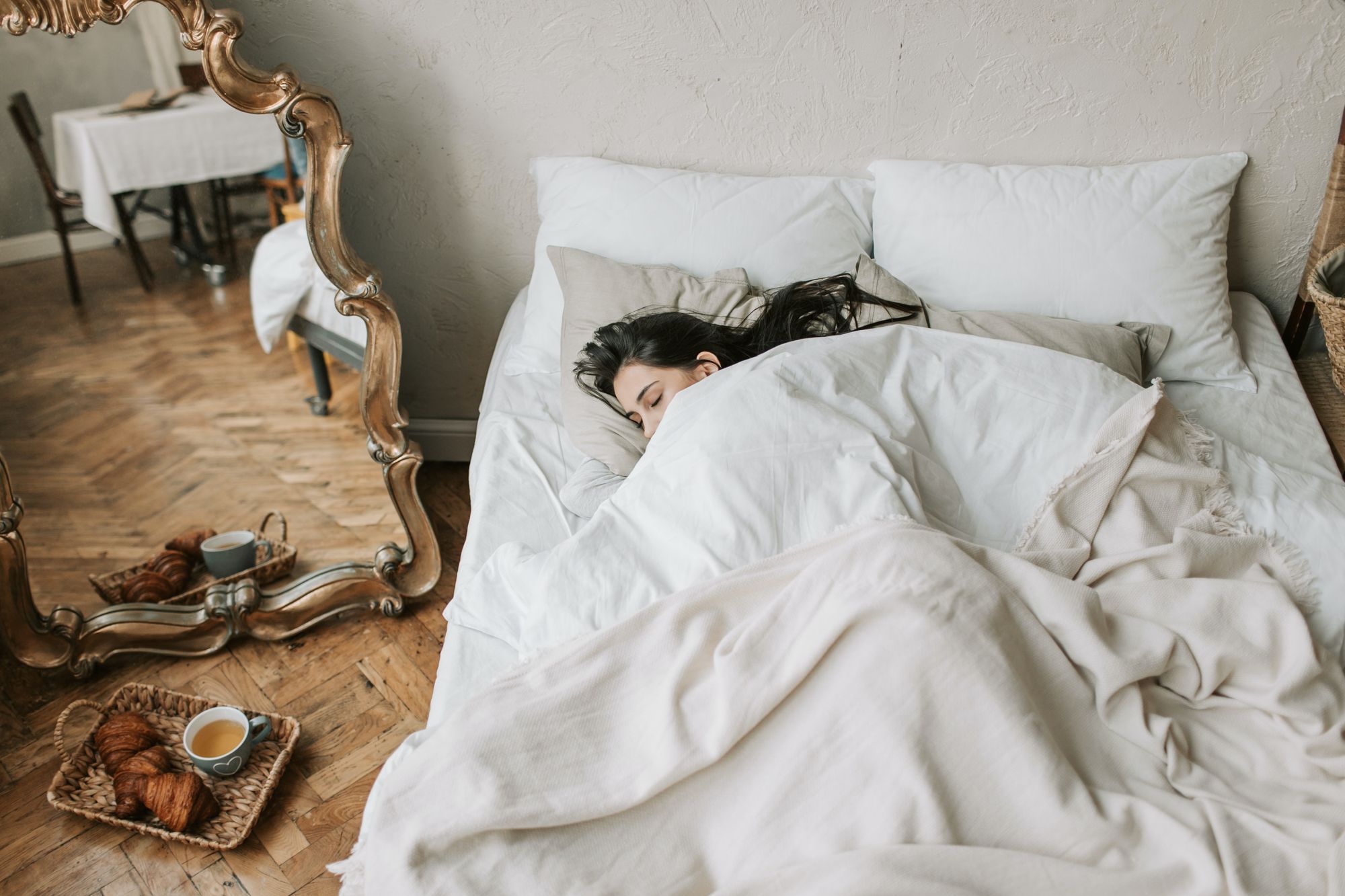Can Magnesium Really Help You Get Better Sleep?


Can Magnesium Really Help You Get Better Sleep?
How many hours of sleep do you average a day? And how good is your quality of sleep?
Did you know that according to a report by the Royal Australasian College of Physicians, between 33% to 45% of Australians have inadequate sleep?
Not having quality sleep means you might end up being groggy and unfocused the next day, because sleep rejuvenates the body. And without it, you can’t function optimally.
Here’s a fun fact — human beings need to spend a third of their lives sleeping, because it is an important part of our daily routine.
From affecting brain function to disease resistance, decreasing risk of disorders, mood enhancement, to pretty much maintaining all activities of the body, sleep is the catalyst that keeps it all together. And unfortunately, as people become busier with work and school, most tend to take sleep for granted.
The quality of your sleep can be affected by your mental wellbeing. It can also be affected by seasonal changes, where sleep durations are shortened due to longer days during spring and summer. These changes in sleeping habits are also affected by an increase in outside temperature.
Sleep quality is indicative of a person’s wellness. This is why it’s important to get adequate, quality sleep because of its restful and restorative properties. A good night’s sleep is imperative for wholesome living. You need to be getting proper exercise and good nutrition to improve your quality of sleep.
What actually happens while you sleep?
Everyone sleeps, but with varying quality and duration. From the outside, it looks like you're just shutting your eyes, but on the inside, a lot of different processes take place. Sleeping involves four stages: three stages of non-rapid eye movement (NREM), and the fourth and last stage is rapid eye movement (REM).
Typical NREM sleep stages start with the transition from being awake to light sleep. Classic signs that indicate this would be your muscles relaxing, heart rate and breathing slowing down, and body temperature dropping. By the end of the non-REM stage, deep sleep is achieved and no eye and muscle movement is observed.
On the other hand, in REM sleep mode, your eyes move rapidly (as the name suggests), while your heart rate and brain activity become active. It’s also during this time that people experience dreams and temporary paralysis. It’s as if you’re awake and asleep at the same time.
These stages run in repetitive cycles throughout your sleep. Most of your sleep time is spent on non-REM sleep, and can be largely responsible for how you feel the next day.
The importance of sleep
Having a good night’s sleep affects both the physical and mental wellness of a person. Sleeping is a way for the body to rest and mend, so your body can stay strong and healthy.
Quality sleep is known to help promote growth, increase muscle mass, and repair cells and tissue — especially in infants and children. It also helps in boosting heart health and reduces the risk of illnesses. It regulates blood sugar levels, and improves the body’s immune response.
Sleep is also often linked to weight management, which in turn has significant effects on other health issues. People tend to weigh and eat more if they have a poor quality of sleep.
In terms of mental wellness, sleep is known to enhance brain function and emotional health. Quality sleep improves cognitive performance, which enables people to be more attentive and perform better at their tasks. While you’re sleeping, the brain processes the day’s memories, which makes your mind sharper and better at remembering more details. It can also assist in improving mental health issues such as depression, and better mood management.

The need for sleep
While sleep is important to maintaining our overall health, how does our body know when it’s time to take a rest? There are two processes that regulate sleep: circadian rhythms and sleep drive.
Circadian rhythms are a reference to your biological clock, which has naturally assigned the time to sleep at night and wake up in the morning. It gets its cues from temperature and sunlight, which is why seasonal changes can affect sleep quality. It is quite a challenge for people working night shifts to stay awake, as their biological clocks are naturally configured to sleep at night and stay awake in the morning/afternoon, but their work requires them to do the exact opposite.
Sleep drive is another process where your body triggers your desire to fall asleep. The longer you stay awake, the stronger the drive to sleep is, and the longer and deeper your sleep is expected to be. There are several factors that affect your sleep drive, such as existing medical conditions and medication, sleep environment and others like napping out of turn during the day. All these can affect your sleep pattern and possibly decrease the urge to sleep at night.
What happens if we don’t sleep well?
Sleep deprivation occurs when a person does not get the proper quality and quantity of sleep — and if you’ve ever experienced it before, you’ll know that it’s no fun! Changes in sleep regulation, travelling across time zones, your mental wellbeing and sleeping conditions can all affect sleep.
So what are some distinctive signs of sleep deprivation? Poor concentration, moodiness, frequent yawning, and increased urge to sleep before night time. Your physical and mental health will also be affected by sleep deprivation. It increases the chance of medical conditions, and also results in poor mental function, such as reduced concentration, efficiency and alertness, slower reaction time and a shorter attention span.
A report by the Sleep Health Foundation in 2017 also found that the total cost of inadequate sleep in Australia was estimated to be $66.3 billion in 2016 to 2017 — from effects such as sleeping disorders, productivity losses, accidents, absenteeism and more.
While some sleep factors are out of your control, it’s best to manage those that can be controlled. Sleep deprivation doesn’t just cause mayhem to one’s mental and physical systems, its harmful effects also extend to the people around us — and you don’t want to be hurting the people you love.

Indicators of good sleep
Curious to find out if you’re getting good enough sleep? There are two key indicators to remember.
The first indicator is sleep quantity, which refers to the duration of sleep. Infants and toddlers should at least have around 12 to 15 hours of sleep to develop their circadian rhythm and encourage growth. Adults on the other hand, need to have 7 to 9 hours of sleep to function properly. Some might choose to sleep more or less, but what’s most important is that they feel refreshed after sleeping.
The second indicator is sleep quality. Judging your sleep quality by sleep duration alone will not give you an accurate answer. Some of the factors to help you determine sleep quality include:
- Sleep continuity without waking episodes — relates to how fast you fall asleep and how uninterrupted the sleep is
- Sleep timing — sleep within what the circadian rhythm dictates
- Sleepiness — sleep satisfaction or how refreshed you feel upon waking
These indicators will help gauge if you are experiencing good sleep on a daily basis or not. If you don’t think you’re getting a good night’s sleep, it might be time to make some lifestyle changes.
Tips for better sleep
Did you know? Changing little things in your daily routine can help you get the best sleep you need. Start taking baby steps today and you’ll be snoozing away in no time.
Try to do more exercise or physical activities within the day. Doing aerobic exercises 1 to 2 hours before going to sleep will help release endorphins, which encourages the brain to slow down and make it easier to fall asleep. Also, exercise elevates the body’s temperature and once it cools down, it makes your body relax and feel sleepy.
Turning your devices off at least 1 hour before sleeping can also help you sleep faster. Light emitted by phones or computers can suppress the release of melatonin or other hormones that help us fall asleep. Your body will thank you for keeping your bright light devices off, and avoid doom scrolling right before sleeping.
Quality sleep can also start from making your sleeping area as conducive as possible. Keeping the lights dimmed, room temperature at 20℃, and minimal background noise is optimal for uninterrupted sleep. Removing objects which can be a source of distraction around your room can also help keep your mind calm and provide a better environment for sleeping.
Start a healthy sleeping habit. Sleep within the same time frame everyday and try to get the recommended duration of sleep. Continuously keeping to the same sleep routine will condition your mind to sleep on time and make it easier to fall asleep.
Improving your diet can also improve your quality of sleep. Minimising alcohol and caffeine intake can help you fall asleep faster, as they increase your energy levels instead. Eating properly portioned meals (especially at night) also makes your body less full, and helps your body cool down faster.
Supplements such as magnesium can also be included in your health regimen as it promotes refreshing sleep and supports healthy sleeping patterns. In cases where your diet may not be enough to receive the daily requirement of magnesium, supplements can help immensely. A great option to check out would be Vitable’s Magnesium Night Powder.

Magnesium and sleep: What’s the connection?
Have you always wondered how magnesium helps you achieve better sleep? What’s the secret behind it?
Magnesium plays a key role in sleep regulation. It can be sourced from different foods such as green vegetables, grains, beans, nuts, and seeds, but can also be added to your diet through supplements like Vitable's Magnesium Night Powder.
People with low levels of magnesium often experience insomnia, restless sleep, or wake frequently during the night. Magnesium helps you attain deeper, restorative sleep by maintaining the GABA neurotransmitter — which is responsible for reducing nerve activity. This helps to make the body feel more relaxed, leading to better sleep.
Magnesium also helps to reduce disturbed or restless sleep — it has been used to treat involuntary limb movements, which can prevent you from having uninterrupted sleep. It acts as a muscle relaxant that blocks calcium-related contractions and improves the quality of sleep.
Studies have also shown that magnesium supplementation improved the quality of sleep, where indicators such as sleep time, sleep efficiency, sleepiness or awakeness, and sleep onset latency (how fast one is able to sleep) improved in test subjects after using magnesium supplements.
Apart from sleep, Vitable's Magnesium Night Powder also helps with muscle health and stress adaptation by regulating stress response in the body.
Start sleeping better with Magnesium Night Powder
Magnesium and sleep go hand in hand to support your health goals, so it’s ideal to take magnesium before bed. Vitable’s Magnesium Night Powder can supplement your diet to give you the sleep you truly deserve.
This quality blend includes natural Passionflower extract and glutamine to maintain and support healthy sleeping patterns. It’s also naturally-flavoured with Summer Berries to make it extra delicious!
Vitable also offers monthly vitamin subscription boxes. All you have to do is complete a short online quiz, and you’ll get a vitamin combination personalised to your unique health needs (from over 1.2 million possible combinations) — how amazing is that!
Get home-compostable daily packs delivered straight to your doorstep monthly for fuss-free ease in getting your vitamin intake sorted. Made from premium quality ingredients backed by science and proudly made in Australia, there’s no reason to say no to Vitable. Get your custom vitamin packs today so you can start having the best sleep you’ve ever had.
*Always read the label and follow directions for use. If you experience any symptoms or if symptoms persist, talk to your health professional. Vitamin and/or mineral supplements should not replace a balanced diet.
